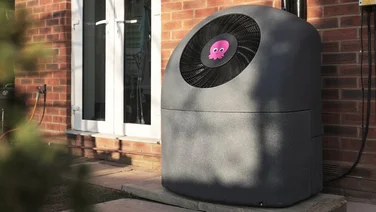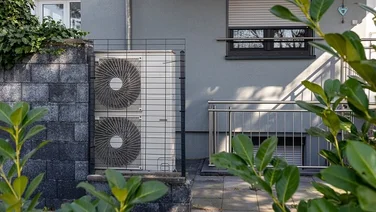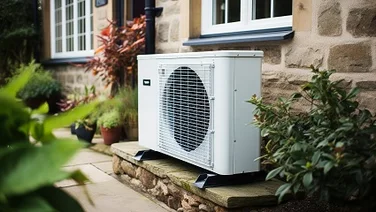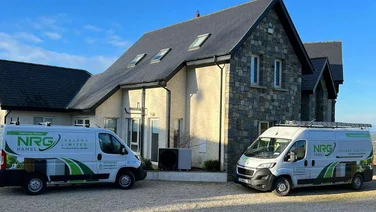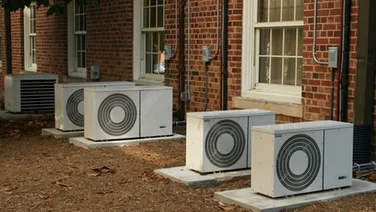- Heat pumps can be connected to your existing radiators
- Heat pumps work best with radiators that are 2.5 times larger than average
- It costs around £250–£500 to install a new large radiator
The government wants to phase out 80% of gas boilers by 2035. With this in mind, many homeowners are turning to alternative heating methods, such as air source heat pumps. Despite the high heat pump costs, they’re roughly three times more energy efficient than boilers.
Installing a heat pump is a simple process, but it can involve more than just switching your gas boiler for a heat pump. For starters, you might need to replace your radiators with larger ones.
If you’re ready to find an air source heat pump that’ll work for your home, you can use our quote tool. Just enter a few details, and we’ll pair you with professional installers, who’ll get in touch and offer their best prices.
If you want to find out more about how air source heat pumps work with radiators first, then read on!
What type of central heating do you currently use?
Get started
Can you use an air source heat pump with normal radiators?
Yes, air source heat pumps work with normal radiators. They absorb heat from the outside air and convert it into a fluid, which is then heated with a compressor and sent to your home’s hot water system.
According to Nemesio, an Octopus Energy customer with a Cosy heat pump: “[The heat pump] is very easy to use, especially with the app. Through my mobile, I can control the room temperature, adjust the water temperature, and even track our energy bills. It’s convenient to have everything in one place.”
That being said, heat pumps work best with radiators that are 2.5 times larger than the standard size. This is because they release heat more slowly and at a slightly lower temperature than boilers, around 40° C compared to 60 °C for boilers. A larger surface area will help disperse heat so that your home will feel the same as it would with a boiler.
Another factor to consider is the material your radiators are made of. Aluminium radiators are better at releasing heat at a lower temperature, compared to steel or cast iron radiators. This is because aluminium is a better heat conductor than some other metals.
Want to find out how much an air source heat pump would set you back? Check out our page on how much air source heat pumps cost in 2024.
Do you need to replace your radiators before getting a heat pump?
Most homes should expect to change about one-third of their radiators, but it’s best to get your home assessed by a professional before making any changes.
Underfloor heating also works great with heat pumps – so if you already have it, you won’t need to make as many changes to your property. If you don’t have underfloor heating, it’s worth knowing that it can usually only be installed on the ground floor. It’s also generally more expensive to install than radiators, costing between £2,000 and £10,000.
You’ll also need to make sure your home has proper insulation to keep in the warmth your heat pump produces. This will improve the energy efficiency of your home and help you consume less energy.
How much bigger do your radiators need to be?
To get the same amount of heat with an air source heat pump as you would with a boiler, your new radiators will need to be about two and a half times bigger than average.
This is because air source heat pumps release heat at around 40°C, whilst boilers can reach temperatures of around 60°C. Heat pumps also generate heat slower than boilers, so you’ll need a larger surface area to achieve the same kind of warmth you’d get with a boiler.
How to work out how many radiators you need to upgrade
The number of radiators you’ll need to upgrade will depend on the size of your property and the number of rooms you need to heat. On average, only one-third of radiators need to be replaced when installing heat pumps.
Unless you are a qualified engineer, it will be difficult for you to work this out yourself. To give you a better idea, heat pump installers can assess your home for you, which can cost about £150. However, installers often waive this fee if you opt for them to both assess your home and install your heat pump.
What type of central heating do you currently use?
Get started
How much does it cost to upgrade your radiators before getting a heat pump?
Upgrading your radiators generally costs between £250 and £500 per large radiator. This can end up being quite pricey when you consider the cost to install an air source heat pump is already around £10,000.
However, the government’s Boiler Upgrade Scheme will knock £7,500 off the cost of a new heat pump. For example, Octopus Energy offers heat pump installation for as little as nothing with the government’s Boiler Upgrade Scheme – but this doesn’t include the cost of replacing radiators with larger ones.
How much you pay in total will depend on the number of radiators you are replacing and the size of your old ones. You should also account for complications during the replacement process, which might increase the cost.
Want to install an air source heat pump but worried you can’t afford it? Find out whether you can benefit from any schemes by visiting our page Are There Government Grants for Air Source Heat Pumps?
Are high temperature heat pumps an alternative?
High temperature heat pumps release heat at around 60°C – a similar temperature to gas boilers. This means it’s less likely that you’ll need to replace your radiators or install underfloor heating.
But the higher level of heat comes at a price. High temperature heat pumps are typically 10% more expensive than regular ones, costing around £11,000, compared to the average £10,000 for a regular heat pump.
They are however just as efficient as regular heat pumps, according to the most recent government report, meaning your energy bills are likely to be same as they would be with a regular heat pump.
To work out which type of heat pump is right for you, try weighing the extra costs associated with a high temperature heat pump against the price of installing new radiators and insulation for a regular heat pump unit.
The best way to do this is by getting as many quotes for all of these costs as you can.
Next steps
Air source heat pumps are a great low-carbon option for heating your home. Getting one over a gas boiler can cut your home’s carbon emissions by about 44% a year.
With the government aiming to phase out 80% of gas boilers by 2035 as part of reaching net zero by 2050, getting an air source heat pump now will prepare you for the future.
We know that heat pumps can be pricey, but installing one doesn’t have to mean completely remodelling your home – and you probably won’t have to get rid of all your radiators.
If you’d like to find out how much an air source heat pump would cost you, use our comparison tool. Once we have your details, we’ll put you in touch with professional installers who will provide bespoke quotes.
Frequently asked questions
Can I use my existing radiators with an air source heat pump?
Air source heat pumps can work with existing radiators, but it depends on a number of factors, including their size.
Heat pumps release heat at a lower temperature than boilers, so larger radiators work best if you want to maintain the same levels of heat.
What radiators work best with a heat pump?
Heat pumps work best with radiators that are 2.5 times larger than standard models.
Aluminium radiators also release heat faster than cast iron or steel ones, making them a great option for heat pump systems.
How hot do radiators get with a heat pump?
Heat pumps release heat at 35°C–55°C, as opposed to boilers, which release heat at 60°C–75°C. This means you’re much less likely to get burnt by your radiators if you have a heat pump.
Can an air source heat pump heat the whole house?
Yes, heat pumps can heat your whole house. Heat pumps are generally used as a replacement to gas boilers, and can provide the same level of heating.

